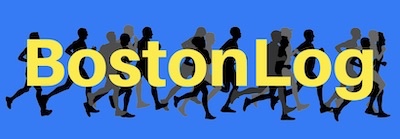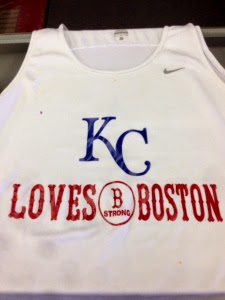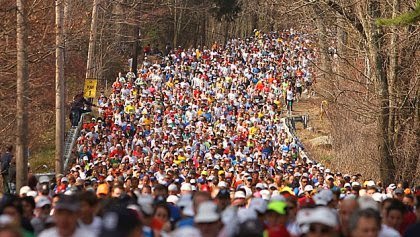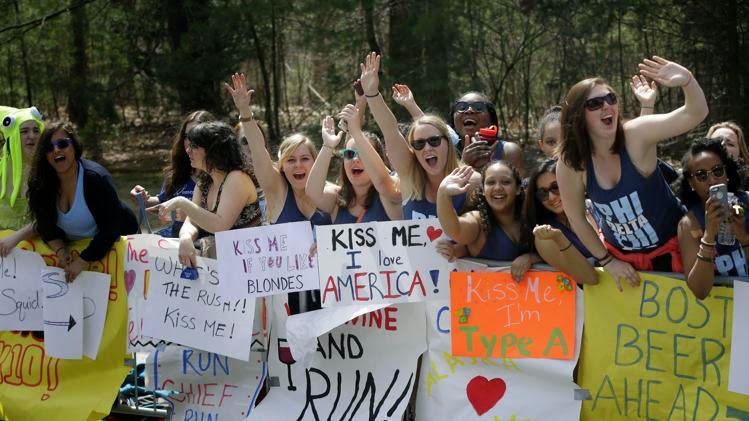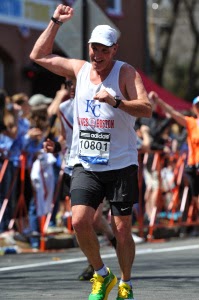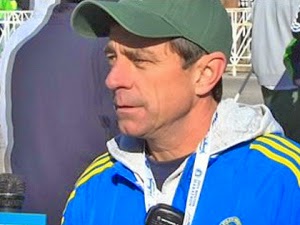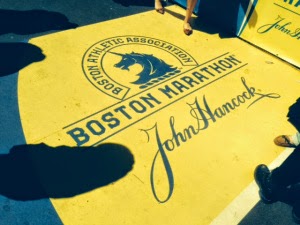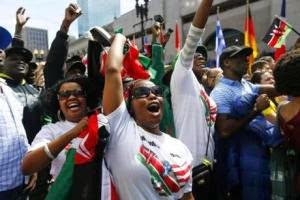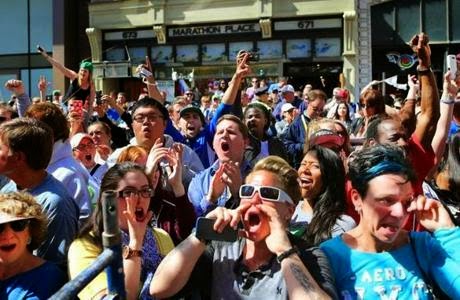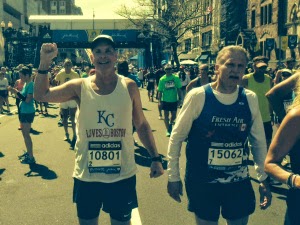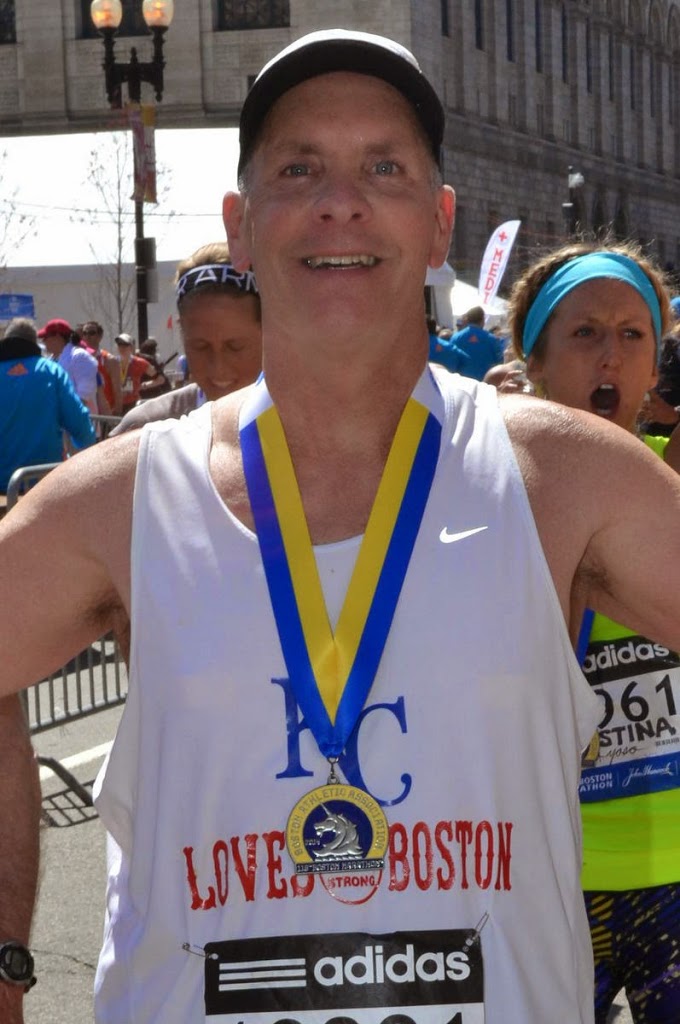The Boston Marathon is special for its steep history, its fabled point-to-point course, the many well-known landmarks along the route and the great runners who have worn the champion’s olive wreath. This Boston though, will be remembered for those who never ran a step.
Spring was slow returning to Boston for the 118th running of the world’s most famous marathon. The green ash, maple, and flowering crab trees that typically greet the current of runners in full bloom were naked and exposed along Commonwealth Avenue and in the Back Bay; their stark branches a reminder of the cruel winter much of the nation was trying to forget.
But spring always finds a way – as does the American spirit.
One year after two cowards turned the 2013 Boston Marathon party into a chaotic life-changing real-life horror movie, the marathon returned to Boston with a resolve and determination to live and survive that even a dandelion would envy.
“Thank you!” screamed the voice from the crowd of onlookers as my second wave of runners rolled down the steep hill out of Hopkinton. “Thank you for coming back to run! You are our heroes today!”
Me? A hero? I wasn’t the only runner surprised to hear this reaction over and over and over from the crowds that lined our 26.2-mile race. I will take many memories with me from this historic marathon but one that will be most special is the unfiltered adulation showered on the runners from start to finish – and even beyond.
And it wasn’t just those who came out of their homes to cheer us who wanted to express their gratitude. That feeling we helped Boston heal came from everywhere. As I haltingly limped back to my hotel on my two-mile walk after the race, I was stopped, cheered and congratulated by almost every person who saw my Boston Marathon post-race silver poncho draped over my stooped shoulders.
And when I say everyone, even a pimp stopped me to offer his congrats. “Dude,” he breathed as he let out a stream of smoke from his Camel. “I couldn’t even run one mile.” And then back to work he went, ushering his cadre into his Camry. (I am guessing he’s working his way up the pimp chain.)
An Asian woman on her bicycle rode beside me as I painfully trudged along the sidewalk and smiled as she gave me a thumbs up sign and shouted congratulations – all while ringing her handlebar bell. A car full of African-American women screeched to a halt on State Street, rolled down their windows and started screaming at me – with huge s miles on their faces. “We are so proud of you!” they yelled. “Thank you so much for helping our city heal!”
This was about the tenth similar salutation I had received since leaving the race area and encountering traffic. I had greeted most with a tired return grin and a humble but mumbled, “Thank you.” But these five ladies got me a bit emotional. I turned to face their car and ripped open my Velcro-sealed silver cape to display my sweaty race singlet, complete with the phrase, “KC Loves Boston,” expertly stenciled on the front by Overland Park’s Nill Bros Sports. This view sent the five-some off into another level of hysteria. Their horn started honking and their screams grew even louder. The last time I received that kind of a reaction from five women was, well…never.
Kevin is a Kansas City-area runner who traveled to Boston with his wife and two teenage daughters. When he and his family stumbled into a small German restaurant shortly after he finished his marathon looking for a bite to eat, the guests in the restaurant rose to their feet and gave him a standing ovation! They repeated this gesture of gratitude for every medal-draped, silver-cape-wearing runner who entered. It is not often we experience raw gratitude from strangers. It was everywhere in Boston on Marathon Monday.
I was still a half mile from my hotel as I shuffled along on spent legs after the race (having somehow taken a wrong turn that put me an extra mile out of the way in Chinatown). With no money or credit cards in my running gear, I took a chance that the 7-Eleven clerk would allow me to purchase a Diet Pepsi on the promise I would return later with payment. Apu stared at me and my superhero cape and shot down my request with the speed that Homer Simpson downs a donut. “NO!” was his quick and no-nonsense reply. He sternly waved me off with his right hand and quickly returned to his paying customers.
I started to leave but was stopped by a man in his 50s who appeared to be just getting off work on the Boston Harbor docks. He was in line with two children, waiting to check out. He sported Popeye-like forearms, complete with sailor tattoos.
“Here,” he said as he fished into his back pocket for his billfold. “We watched some of the marathon and I would really like to buy you a couple of sodas.” He shoved a five-dollar bill into my hand and added, “Don’t worry about paying me back,” he added. “You already have.” He was gone before I returned to the check-out desk with my drinks.
The names of the small towns that serve as hosts for our race to Boston were well marked at each entry point. Flags billowed in the afternoon breeze with the names of Ashland, Framingham, Natick, Wellesley, Newton, Brookline and finally Boston.
My pace for this Boston was measured – another word for slow. A lady ahead of me at the ten-mile mark had printed “Mother of 7” on the back of her shirt. But I chose to experience and enjoy this Boston rather than race it. And there was so much to enjoy!
The first few miles out of Hopkinton are run on a narrow stretch of Highway 135 that doesn’t allow much room for the 9,000 runners each wave sends forth every 25 minutes, let alone spectators. But almost every bit of road shoulder and front yard housed locals who were there simply to make sure their screams of gratitude found our ears. It was so loud at some points along the route that it became a cacophony of sound, with individual voices indistinguishable.
The famous brownstone train station in Framingham marks the 10K point in the race and the road widens here to allow for a large gathering of folks to enjoy the race. This was the point in the race where I knew this Boston was going to be unlike any other Boston.
It seemed that every father, every mother, every daughter and every son wore a blue and gold shirt or waved a sign that read, “Boston Strong.” And the runners responded with arms raised, clenched fists thrust overhead and impromptu stops to high-five a child, accept a wet nap, hug a stranger and enjoy the fleeting yet undeniable bond between runner and motivator.
The Wellesley coeds had promised “a Wellesley experience like no other” for this 118th Boston. They did not disappoint. The line of college women leaning forward to greet each runner with a kiss began well before its traditional starting point and lasted far beyond where it usually ends. I considered imbibing on this forbidden fruit as I slowed my pace for a better view. I have always declined on my other three trips past the Wellesley gauntlet.
A “Kiss me, I’m Ovulating,” sign got me to grin but not pucker. The 60-something runner in front of me showed none of my grand fatherly inhibitions. The small bald man hopped up and stole a peck on the cheek from a buxom brunette. He was back atop the fence a few seconds later sampling a cute Korean. I started thinking gramps here might run Boston just for his otherwise illegal dalliances with underage coeds. There are worse vices.
The town of Wellesley immediately follows the tunnel of love at the all-girls college. It is an upscale, preppy burg with expensive shops and restaurants. Its inhabitants share equally gourmet tastes. The run past these Boston aristocrats is usually sedate and proper. As a runner, you feel a bit like a rhino in the zoo as the folks in Wellesley look on and sip a spritzer with their crab spread and crisps.
But this was a different Boston Marathon – and this was a far different Wellesley! The crowds in the square were triple their normal size and their screams were as loud as the coeds’ yelps we had just left. Prim, proper, perfect and perfunctory Wellesley was acting like Arrowhead Stadium on game day. And we, the runners, were the Chiefs. It was glorious.
One of the most dreaded portions of the Boston Marathon is known as “The Newton Hills.” Old John Kelly is credited with saying his heart was broken here in Newton in 1936 when Tarzan Brown passed him on the final steep grade that zapped his legs and his willpower. Newton and its Heartbreak Hill at the 20-mile mark is where many believe this race really starts…and ends for some.
There is a fire station and a large intersection in Newton that marks a sharp right turn into the Newton Hills. The party taking place at this spot on this course on this day was so loud and so damn fun that I was tempted to stop and party right along with those wicked crazy Bostonians.
The Red Sox anthem, Neil Diamond’s Sweet Caroline, happened to be blaring from the massive speakers set up by the firemen as I rolled on by. The pounding of the bass had my racing bib dancing.
“Warm, touchin’ warm, reachin’ out
Touchin’ me, touchin’ you…”
I was tired here at almost 18 miles but not too tired to get a little feisty with the crowd. I raised my hands and asked the crowd to give me their best. They answered and so did Neil.
“Sweet Caroline
Good times never seemed so good, SO GOOD! SO GOOD!”
I don’t know if the Newton firehouse played that song on a loop all day long or if I was just lucky enough to hit that intersection at the perfect time – but I pumped my fist heading into those hills and smiled right through Heartbreak.
Each town, each neighborhood and each street seemed to bring their game to unprecedented levels for this race. Dave McGillivray, the Boston Marathon race director for more than 25 years, talked about how the bombings stole the marathon from him and Boston. As he tried to enter the finish-line area last year after the disaster, he was abruptly and rudely stopped by a policeman guarding the area.
“But you don’t understand,” McGillivray sputtered. “THIS IS MY RACE!”
“Not anymore it isn’t,” the stoic cop answered.
McGillivray’s desire to make the 2014 Boston Marathon his race once again motivated him throughout the next 12 months. I listened to him speak to a room full of marathoners the day before the race – a room that included Bill Rodgers and five other past Boston legends. He ended his speech with these words.
“We’re taking back Boylston Street,” McGillivray began slowly. “We’re taking back our race! We’re taking back our sport! We’re taking back our city!” He left the room high-fiving the audience under a crescendo of applause. I was left shaking from the passion he displayed.
The people of Boston may not have been in the room with McGillivray but they heard his words. More importantly, they responded. They responded like nothing I have ever experienced. It is one thing to be loud in an arena or stadium for a two- or three-hour game and cheer the big plays as they unfold. It is another thing entirely to cheer like a maniac for five and six hours for every nameless runner who crosses your path.
Additional security was omnipresent throughout the day, starting with armed gunmen on school rooftops in Hopkinton. I was extremely concerned about how the increased security at this Boston Marathon would diminish and change the atmosphere at and near the finish line. In years past, these are some of the most vociferous crowds along the 26-mile course. Fenway sits near here and Red Sox fans pour onto Commonwealth Ave. and up near Boylston Street to catch the runners in their last two miles.
What I saw and heard those last few miles will remain stored in my memory when I want to recall a moment in my life that was perfect. I was overwhelmed with the sincerity and adoration from these strangers. That sounds nuts and let me tell you – it was!
The last few miles of any marathon are difficult. The stretch along Commonwealth Avenue from mile 23 on is just crushingly hard. You so want the pain to end but those last three miles feel like an impossible task. The final 600 feet on Boylston is known to marathoners as the longest 600 feet in Boston.
But these last few miles flew by for me this trip. Not that I ran them quickly, but more because I wanted to drink in the crowds that stood so thick and so deep that they appeared to be one, not many. As we ran as one, they screamed as one. Their screams were truly deafening – I met runners the next day whose ears were still ringing.
I could no longer make out, “Go KC!” or “Boston loves KC, too!” I was almost two hours late to Meb’s winning finish and these folks were acting like I was the winner. There is no question in my mind that I was.
Greg Hall
Kansas City, Missouri
April 21, 2014
Age – 59
Bib # 10801
3:49:50
[Greg’s blog can be found here.]
